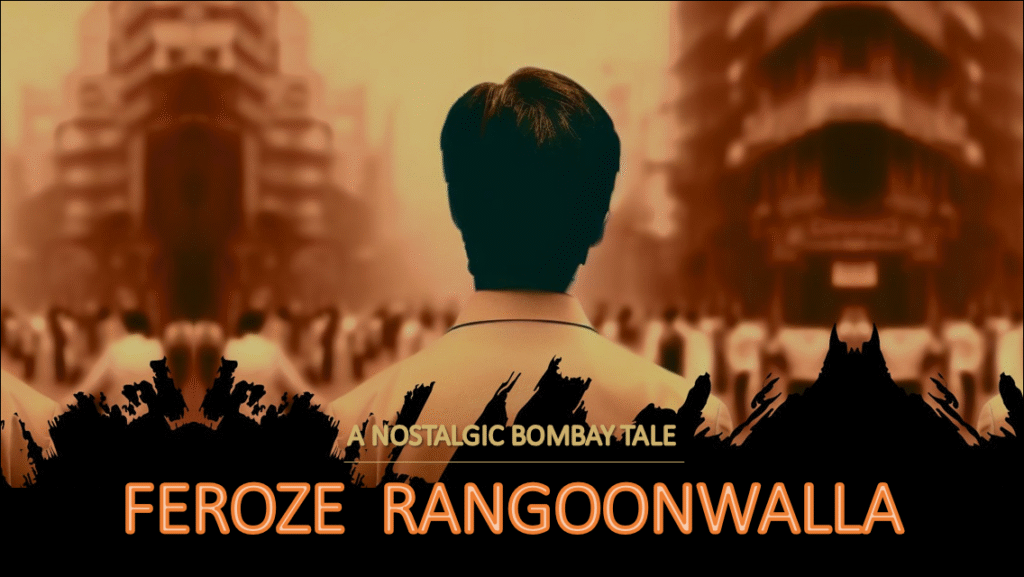
It was 1975. After finishing my Master’s in engineering, I was working with a large engineering company in Bombay. I shared a 2-bedroom flat with 3 other college friends, one of whom worked in a chemical company and the other two were with an IT company. The flat was on the third floor of a building in Mahim located on Cadell Road, named after PR Cadell, the erstwhile municipal commissioner of Bombay. Though the road has subsequently been renamed Swatantrya Veer Savarkar Marg, it continues to be referred to by its old colonial name. Several famous landmarks of Mumbai such as Shivaji Park, Siddhi Vinayak Temple, Chaitya Bhoomi, Mayor’s Bungalow, and Mahim Dargah are located on Cadell Road.
The compound wall of the ground on which our building stood was separated from Cadell Road by a 4-foot wide footpath. The wall of the building was about 10 feet away from the compound wall. The windows of our flat overlooked the road. Living in that flat we experienced the meaning of Bombay being a city that never slept. Throughout the night, we were kept awake by the vehicles that zipped past the house in both directions. The penchant of Indians to honk for no apparent reason, often using horns that produce high-pitched sing-song staccato sound added to the variety of cacophony that played out thirty feet below us.
The Mahim Chowpatty (beach) was behind our building, separated by two more rows of houses. A narrow path from Cadell Road about 50 feet from the gate of the building to your right as you got out of the building led to Mahim Chowpatty. The houses were separated from the beach by a stone wall. During high tide the water would almost reach the wall, on occasions when the sea was particularly rough, the water level reached half-way up the wall. I would often sit on the wall late evenings with my feet dangling from the wall towards the ocean listening to the alternating gurgling sound of the approaching waves and their quiet dissipation as they receded. The rhythmic rise and ebb of the waves with the accompanying sound produced a mesmerizing calming effect on me, the like of which I have rarely felt in any other situation.
To the left of the gate of the building as you exited was Sitaladevi Temple Road at a right angle to Cadell Road. A broad road with wide footpaths on both sides, it led to the residential and commercial areas of Mahim away from the ocean. The road was dotted with multiuse buildings, with residences from the first floor upwards and small shops and commercial establishments on the ground floor. The Paradise Cinema Hall was located about 500 meters from the junction of the two roads on your right as you walked on Sitaladevi Temple Road away from Cadell Road. There were several small eateries close to Paradise that served simple fare at low prices. On days our cook was on leave we would sometimes have our dinner in one of the eateries as the effort to go to better restaurants was overwhelming after a full day in the office.
The seventies were a period of severe power shortages. Staggered weekly off was in force to reduce the peak demand of power. Our weekly off days were Thursdays (for me), Tuesdays, and Sundays. I would spend the day exploring Bombay using public transport, usually returning home by early evening. I recall it was a Thursday in August 1975. It had been raining. The rain had just stopped as I got off the bus close to Paradise Cinema. I was walking briskly on the sparsely crowded footpath towards our flat when a young man walking towards me accosted me. He was of medium build, fair, and with light eyes. “I am Feroze Rangoonwalla’, he declared, extending his right arm towards me for a handshake.
I stopped without reciprocating the gesture. Seeing my blank expression, the stranger continued, “I am a table tennis player. I have played at the national level”, he said. “Okay”, I said, still a little puzzled as to why I was stopped by the stranger. “I work with Indian Railways”, he said. I was even more puzzled. Why was he proffering such personal information to me? He took a plastic card from his pocket and insisted that I look at it closely. The card had his mug shot and name and below was printed Western Railway. “Can you help me? My pocket got picked. I need some cash to eat and go home.” I was not sure how to respond. I asked, “Where is home?” “Churchgate”, he said. “How much do you need?”, I asked. “Give me hundred rupees”, he said. That was more than what I thought he would need. Sensing my discomfiture, he immediately said, “Please trust me. I am a government employee. I will return your money tomorrow.” “How will you do that?”, I asked. By now I had become more cautious. I did not want to disclose my name or home address. Sensing my caution, he proposed, “I take this route every evening. We can meet tomorrow at the same time (7:30 PM) at the same spot – opposite Paradise Cinema. I would return your money.” I still hesitated. I considered the pleading figure, who conversed fluently in English. Could I not be in a similar situation some day? What would I do if no one helped me? His option was to walk all the way from Mahim to Churchgate. That would be a long walk indeed! I gave him the money and told him that I would be there the next evening between 7:30 and 8 PM.
I reached home and narrated the episode to my friends. All three of them were skeptical of the money being returned. We had heard that one had to be very careful in Bombay against all kinds of cons that were pulled off on unsuspecting newcomers. The next day, I duly reached Paradise Cinema, a little before 7:30 PM. I stood there for almost an hour. Feroze Rangoonwalla did not show up. Maybe, for some reason, he could not make it on that day. I repeated the waiting routine on two subsequent days. No Feroze Rangoonwalla showed up. It became clear that I had been conned. And yet, I could never shake off the feeling that maybe he was indeed an honest man, who for some legitimate reason had been unable to make it to the meeting point agreed between us. He had no way of contacting me.
I left Mumbai in 1976 and the incident became a distant memory. Occasionally, when I recalled the encounter, I would still give Feroze Rangoonwalla the benefit of the doubt. Did he appear a crook to me? No.
I duly completed my doctorate in management from IIMA and joined the faculty of the institute in 1980. It was 1984. I was in Bombay for work. After a meeting with Tata executives at the Bombay House, I was walking towards Churchgate. I planned to meet a friend in the Churchgate office of Hindustan Unilever, before taking a taxi to the airport. I crossed the road near the Hutatma Chowk with the crowd barely avoiding the crowd crossing over from the other side. As I reached the footpath after crossing the road, a man coming towards me from the opposite direction accosted me, with an extended hand, saying, “I am Feroze Rangoonwalla.” I couldn’t believe what I heard. I looked at the man closely. Yes, it was the same man I had met in Mahim nine years ago. Medium build, fair, light eyes, and a little older than the man I had met. He had obviously not recognized me as I would be one of the hundreds of his victims. Gazing at him steadily I said, “You are a table tennis Player, and you work for Indian Railways.” I can still recall the utterly shocked expression on his face. Without a word he turned and walked away briskly, putting distance between him and me as quickly as he could. I watched him as he disappeared into the crowd.
